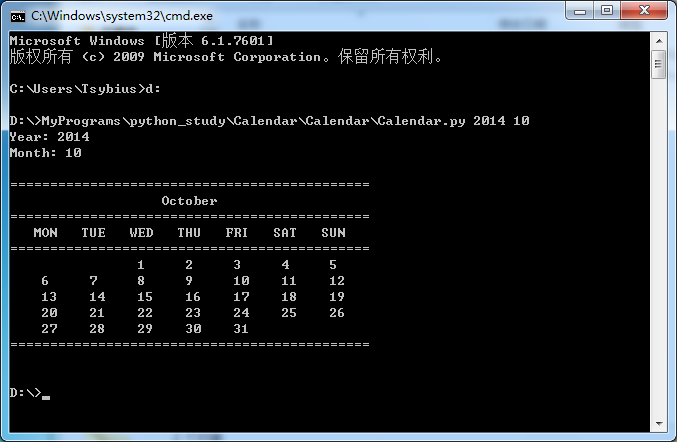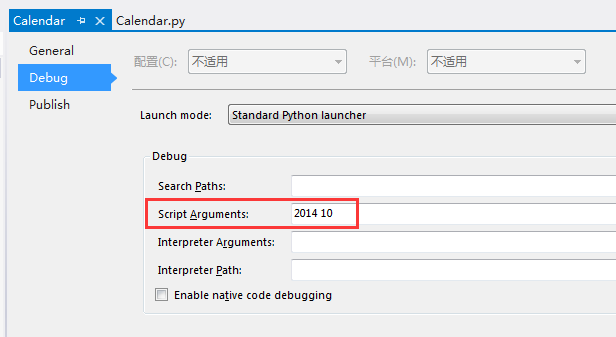今天初学Python写了一个用于计算指定年指定月日历的脚本
我的Python版本:Python 3.4.2
输入:脚本名 年(4位数字,1900-2100) 月(1-2位数字,1-12)
输出:打印的指定年月日历信息

Calendar.py
import os
import sys
# check if the number of input is legal
if len(sys.argv) != 3:
print('Invalid input! Example: 2014 12')
os.system('pause') # "press any key to continue..."
os._exit(0) # terminate this script
# check if input(year) is legal
print("Year: %s" % sys.argv[1])
if not str(sys.argv[1]).isdigit():
print('Invalid input! Year must be a positive integer')
os.system('pause')
os._exit(0)
elif int(sys.argv[1]) < 1900 or int(sys.argv[1]) > 2100:
print('Invalid input! Year must bigger than 1900 and smaller than 2100')
os.system('pause')
os._exit(0)
# check if input(month) is legal
print("Month: %s" % sys.argv[2])
if not str(sys.argv[2]).isdigit():
print('Invalid input! Month must be a positive integer')
os.system('pause')
os._exit(0)
elif int(sys.argv[2]) < 1 or int(sys.argv[2]) > 12:
print('Invalid input! Year must bigger than 1 and smaller than 12')
os.system('pause')
os._exit(0)
# check: is a leap year or not
# param @year: the year input
# return: leap: True; not leap: False
def IsLeapYear(year):
if year % 4 != 0:
return False
if year % 100 == 0 and year % 400 != 0:
return False
return True
cur_year = sys.argv[1] # the year input
cur_month = sys.argv[2] # the month input
# counter: the first day in cur_year, cur_month, it indicates the day of week
counter = 0
for i in range(1900, int(cur_year)):
if IsLeapYear(i):
counter += 366
else:
counter += 365
days_in_month = [31, 28, 31, 30, 31, 30, 31, 31, 30, 31, 30, 31]
days_in_month_leap = [31, 29, 31, 30, 31, 30, 31, 31, 30, 31, 30, 31]
for i in range(1, int(cur_month)):
if not IsLeapYear(int(cur_year)):
counter += days_in_month[i - 1]
else:
counter += days_in_month_leap[i - 1]
# first_day_in_cur_month: what day is the first day in cur_month
first_day_in_cur_month = counter % 7
# name of each month
month_name = ['January', 'February', 'March', 'April', 'May', 'June', 'July',
'August', 'September', 'October', 'November', 'December']
# char numbers of each line
calendar_width = 45
# print title
print()
print('=' * calendar_width)
space_num = (calendar_width - len(month_name[int(cur_month) - 1])) // 2
sys.stdout.write(" "* space_num)
sys.stdout.write(month_name[int(cur_month) - 1])
sys.stdout.write("\n")
print('=' * calendar_width)
print(" MON TUE WED THU FRI SAT SUN")
print('=' * calendar_width)
# establish a calendar
# calendar = [[0] * 7] * 6 # can not do like this! change a number then change a column
calendar = [[0, 0, 0, 0, 0, 0, 0],
[0, 0, 0, 0, 0, 0, 0],
[0, 0, 0, 0, 0, 0, 0],
[0, 0, 0, 0, 0, 0, 0],
[0, 0, 0, 0, 0, 0, 0],
[0, 0, 0, 0, 0, 0, 0]]
days_count = 0
if not IsLeapYear(int(cur_year)):
days_count = days_in_month[int(cur_month) - 1]
else:
days_count = days_in_month_leap[int(cur_month) - 1]
for i in range(0, days_count):
x = (first_day_in_cur_month + i) // 7
y = (first_day_in_cur_month + i) % 7
calendar[x][y] = i + 1
# print calendar
for i in range(0, 6):
if(i != 0 and calendar[i][0] == 0): # no more days to output then break
break;
sys.stdout.write(" " * 3)
for j in range(0, 7):
str_date = str(calendar[i][j])
sys.stdout.write(" ")
if str_date == "0":
sys.stdout.write(" ")
elif len(str_date) == 1:
sys.stdout.write(str_date)
sys.stdout.write(" ")
else:
sys.stdout.write(str_date)
sys.stdout.write(" " * 3)
sys.stdout.write("\n")
# print the end line
print('=' * calendar_width)
print()
# os.system('pause')
补充说明:使用 Visual Studio 上的 Python 插件时,调试时要设置命令行输入参数,需要进行如下两步
1)项目→Calendar属性(Calendar为项目名)

2)在属性界面的Debug选项卡中,设置“Script Arguments”,这个程序的输入为“2014 10”

优化:(2014年12月31日)
这3个优化的地方都需要引用calendar,设变量year存储年,变量month存储月
1)遍历一个月的所有天,在本文的代码中,用range(0, days_count),
可以用calendar.monthrange(year, month)代替
2)找出一个月的第一天是星期几,之前用first_day_in_cur_month保存,
可以用calendar.weekday(year, month, 1)代替
calendar.weekday函数中,星期一则返回0,星期二则返回1,以此类推,星期日返回6
3)日历矩阵可以直接用calendar.monthcalendar(year, month)得出
END
来源:oschina
链接:https://my.oschina.net/u/1425762/blog/356244